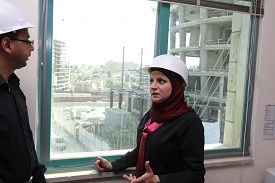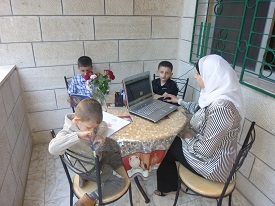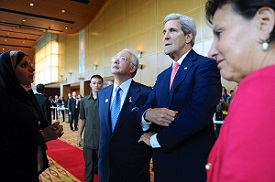By Hyacinth Mascarenhas
“Children should have the right to have their mother at home, not in the form of a maid, babysitter or grandmother,” says Nermin Saad. “At the same time, don’t these mothers have the right to use their degrees and qualifications flexibly whilst taking care of their children?
With a degree in mechanical engineering from the University of Jordan, Saad, a mother of three, sought to balance motherhood and a career by working from home and helping her husband with real-estate construction projects in Saudi Arabia. With the help of his colleagues, Saad’s husband – also a mechanical engineer – began to outsource engineering tasks that she could work on remotely. After building a client base in the kingdom for more than a decade, Saad moved to Jordan but built a simple website to continue her work as a freelance engineer.
As the couple began to take on more projects, Saad decided to put an advertisement in a local newspaper. The advertisement consisted of just seven words in English: “Female engineers required to work from home.” Within a week, she received more than 700 resumes.
 “This was a remarkable response for me,” said Saad. “I was expecting only 2-3 engineers because I thought that since Jordan is much freer, more women would be working outside their homes.” The response she received for her advertisement encouraged to launch Handasiyat, a virtual construction engineering firm that recruits women working from home to provide engineering support services operating in the MENA region.
“This was a remarkable response for me,” said Saad. “I was expecting only 2-3 engineers because I thought that since Jordan is much freer, more women would be working outside their homes.” The response she received for her advertisement encouraged to launch Handasiyat, a virtual construction engineering firm that recruits women working from home to provide engineering support services operating in the MENA region.
According to the IMF, women represent 40% of the global work force. In the Middle East, women represent just 21% of the work force.
“In Jordan, we have very highly educated women since education is available for both men and women. We also have this custom that you do not get married until you have finished your university degree and qualifications. After about 1-2 years of experience, women get married and after 1-2 years of marriage, they have their first baby,” explains Saad. “But in the MENA region, we don’t have babysitting facilities that are quite common in Western countries. When you have children, you are the only one responsible for them. Your mother, grandmother or mother-in-law may help, but those are just on a temporary basis. So these experienced women are either forced or by their own choice, due to the struggle of balancing work and family, sit at home just to take of their children with lots of time to spare doing nothing.”
Jordanian women’s contribution and involvement in the workforce has remained low with women forming just 14% of the workforce in Jordan, according to a study by the Higher Population Council. Married women, on the other hand, make up just 7.4% of the labor force.
 Officially launched in 2012, Handasiyat focuses on MEP (Mechanical Electrical Plumbing) or the electric mechanical field in engineering which focuses on the transition stage between the idea and execution of a building’s construction process. Saad and her team work on designing building layouts which range from water to electricity networks.
Officially launched in 2012, Handasiyat focuses on MEP (Mechanical Electrical Plumbing) or the electric mechanical field in engineering which focuses on the transition stage between the idea and execution of a building’s construction process. Saad and her team work on designing building layouts which range from water to electricity networks.
“For a building with just two floors, you may end up with at least 15 layouts for a small building. It’s a basic need that no building can do without,” said Saad. “There is also a policy in Saudi Arabia that all official documents should be submitted in both English and Arabic. But the engineering field is almost entirely in English. This opened up another great opportunity for us to get involved in translation, especially female engineers from other fields such as civil and architectural engineering.”
Since its launch, Handasiyat has received numerous accolades and awards for its innovative solution to promoting and providing economic equality in the MENA region. Last year, Saad won the 2013 Best Female Competitor in the Global Innovation through Science and Technology Initiatives Tech-I competition. She also received the 2013 TIAW World of Difference award and was mentioned by U.S. Secretary of State John Kerry at the 4th Global Entrepreneurship Summit in Malaysia last October.

“When Nermin [Saad] talked with female engineers like herself across the Middle East, she realized that so many of their talents were being squandered in countries where cultural norms make it difficult for women to work outside of their homes,” said Kerry. “Nermin’s dream is that in five years, her website will be the first engineering company in all of the Middle East and North Africa staffed completely by women.”
Her unique and innovative initiative has been selected as a finalist in the Women Powering Work: Innovations for Economic Equality in the MENA Region competition, launched by Ashoka Changemakers and GE. Her initiative will also tap into the region’s growing infrastructure and construction market – one of the world’s most attractive markets due to its size.
According to Arab News, “a total of $4.3 trillion will be invested in construction projects across the MENA region by 2020, an increase of 80 percent compared with current figures,” with Saudi Arabia taking the lead.
“Saudi Arabia, in the construction field, is known as the sleeping giant,” said Saad. “It is very lazy in the construction field but if she wakes up, she will shock the whole region. Dubai would be nothing compared to Saudi Arabia if she wakes up.”
As the largest hub for female engineers in the MENA region, Handasiyat, is poised to reintroduce women into the workforce and allowing for flexible working conditions whilst taking the local culture, customs and obligations into consideration.
“The engineering field has its own character that involves spending a lot of hours outside the home, sometimes on demand. As a mother, it isn’t very flexible for you to work around that. So how can you offer me higher education but you cannot create a workplace, considering that we are Arabic people with our own religion, stigmas and obligations, which offer me flexible work to compete with the high level of education that you have given me,” said Saad. “I believe that this online platform with the flexibility of the internet is taking I believe this is taking a step forward to offer flexible jobs for those passionate women who want both a career and family life.
Editor’s Note: Additional information about the competition, assessment criteria and fascinating trends that are emerging from the finalists’ solutions can be found at www.changemakers.com/MENAwomen.
Follow #womenWork on Twitter to receive the latest on trends and competition news.




















I had the chance to contact Engineer Nermin, and I really do admire her cooperation with me in my project.
She is passionate about her work and she do her work in as perfect as possible.
Good luck Nermin and lots of congrats to your success.
Great project I would be more than happy to work in such a project
Best Wishes
Amazing project
Best wishes
Engineer Nermin I’m so proud of you
Good Job and keep going inwards and upwards
[…] Striking a balance: Handasiyat empowers female engineers, mothers in the MENA region. January 14th, 2014. […]